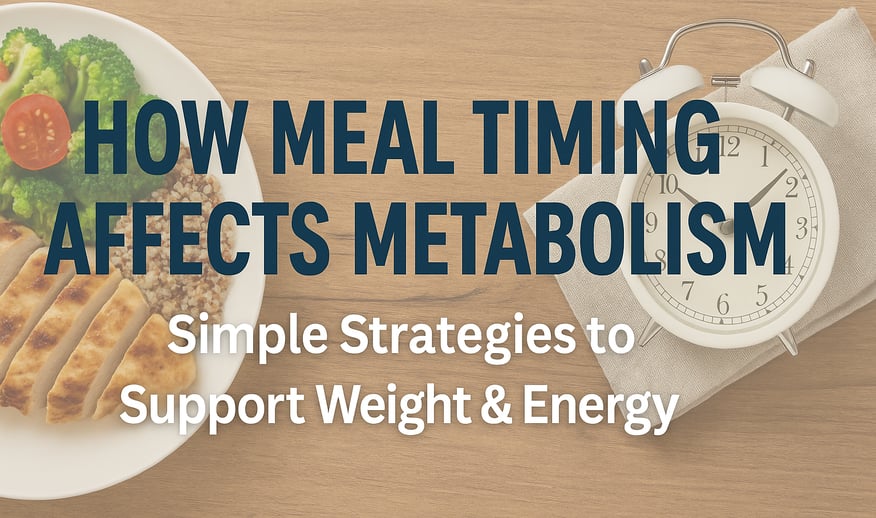How Meal Timing Affects Metabolism: Simple Strategies to Support Weight & Energy
Discover how eating at the right times can boost your metabolism, improve energy, and support weight management. Learn science-backed tips, practical strategies, and top tools to help you align meals with your body’s natural rhythm.
5/13/20252 min read


Does When You Eat Matter? The Real Impact of Meal Timing on Your Metabolism
We hear a lot about what foods to eat, but not nearly enough about when we eat them. Turns out, your meal schedule can have a major impact on how your body processes energy, manages weight, and even handles stress.
This concept is called chrononutrition—basically, eating in sync with your body’s internal clock. Let’s break down why timing matters, what the science says, and how you can use it to support better metabolic health (without overcomplicating your life).
What Is Chrononutrition & Why Does It Matter?
Your body runs on a 24-hour cycle, called your circadian rhythm. It affects everything from sleep to hormone release—and yep, even how well you digest and burn food.
Studies show that when you eat out of sync with your circadian rhythm (like super late dinners or constant snacking), it can throw your metabolism off, raise cortisol levels, and increase the risk of weight gain or insulin resistance.
On the flip side, eating earlier in the day, when your metabolism is naturally more active, has been linked to better blood sugar control and weight management.
Intermittent Fasting Simplified
Intermittent Fasting Guide for Busy People
A no-BS guide with easy meal plans, fasting windows, and real-life tips to make IF doable even on a tight schedule.
The Science on Meal Timing & Metabolism
A few big takeaways from recent research:
Time-restricted eating (e.g., eating all your meals within an 8–10 hour window) helps reduce inflammation, improve insulin sensitivity, and support weight loss—even without calorie counting.
Eating a bigger meal earlier in the day (like a hearty breakfast or lunch) seems to improve metabolism and energy levels better than loading up at night.
Keeping meal times consistent day to day helps your body work more efficiently and reduces stress on your system.
One study even found that people who ate most of their calories before 3 p.m. lost more weight than those who ate later—even though both groups ate the same foods.
Smart Nutrition Scale
Etekcity Smart Nutrition Scale
A sleek scale that tracks macros and calories in real-time through an app. Perfect for staying aware of what you’re eating—without obsessing.
Real-Life Tips to Get Started
No need to flip your whole routine overnight. Here are some simple ways to line your meals up with your body’s natural rhythm:
Eat within two hours of waking up – this helps fire up your metabolism early.
Make lunch your biggest meal – your digestion is strongest mid-day.
Wrap up dinner 2–3 hours before bed – give your body time to digest before winding down.
Stick to regular meal times – your metabolism loves structure.
It’s less about being perfect and more about creating a rhythm your body can depend on.
Meal Prep Made Easy
Prep Naturals Glass Meal Prep Containers
Microwave-safe, portion-controlled containers that help you plan ahead and avoid last-minute junk meals.
Expert Take
Dr. Satchin Panda, one of the top researchers in this space, puts it simply: "When you eat can be just as important as what you eat." His studies show that syncing meals with your internal clock can improve everything from energy to metabolic health to sleep.
Final Thoughts
Food timing isn’t about stress or restriction—it’s about giving your body the best chance to thrive. When you eat in sync with your natural rhythm, everything feels a bit easier: energy, digestion, sleep, even your cravings.
So try easing into it. Start with earlier dinners, consistent meal times, or a simple time-restricted eating window. Your metabolism will thank you later.
FITNESS
Nutrition
WellnesS
info@movebetterco.com
© 2025. All rights reserved | Privacy Policy | Terms & Conditions